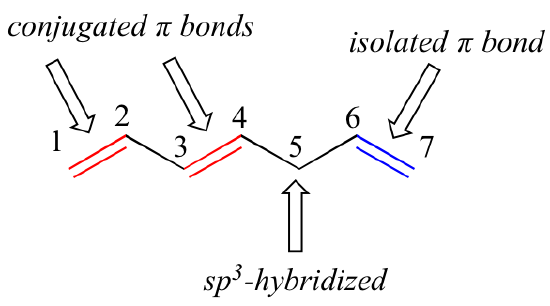In my chemistry class in high school we just started with resonance and my teacher said that its the phenomenon of moving around of negative charges, lone pairs or pi electrons with no change in position of atoms and in conjugation with pi electrons. Could someone explain what the statement in bold is supposed to say?
$\begingroup$
$\endgroup$
3
-
$\begingroup$ Charges do not actually move around in resonance. They are not structures in equilibrium. They are simply ways of representing a hybrid structure, when no diagram may be used individually to do so. $\endgroup$– Solid - NMRCommented Sep 13, 2021 at 1:42
-
2$\begingroup$ You should ask your teacher to better illustrate what he/she means. Anyhow, you can read the Wikipedia page on "Conjugated system" to get more info on what he/she is trying to say. It basically has to do with the definition of the word "conjugated". $\endgroup$– Brian BlumbergCommented Sep 13, 2021 at 2:04
-
3$\begingroup$ "Conjugated double bonds in a molecule mean that the single and double bonds alternate". If you can write a Lewis structure like that, every atom in a chain will have an atomic orbital that can interact with its two neighbors (typically, a p-orbital), giving rise to the molecular orbitals that span multiple atoms in a chain or ring. $\endgroup$– Karsten ♦Commented Sep 13, 2021 at 3:06
Add a comment
|
1 Answer
$\begingroup$
$\endgroup$
1
Did you look up conjugation in the dictionary? It implies joining, but in chemistry it is joining the atoms in a special way.
The chemical meaning is straightforward, see https://goldbook.iupac.org/terms/view/C01267
In the original meaning a conjugated system is a molecular entity whose structure may be represented as a system of alternating single and multiple bonds
More explanation here Chemistry LibreTexts
-
$\begingroup$ This answer illustrated that conjugation has in principle a purely topological meaning. It is worth to note that the word conjugation used to mean delocalisation it is a somewhat a contradiction in term, in the sense that a perfect organic metal would have no alternating bonds. Still, the existence of alternated ie conjugated limiting structures is a requisite for resonance / delocalisation, and this makes the two terms synonyms in practice. $\endgroup$ Commented Sep 13, 2021 at 8:48

